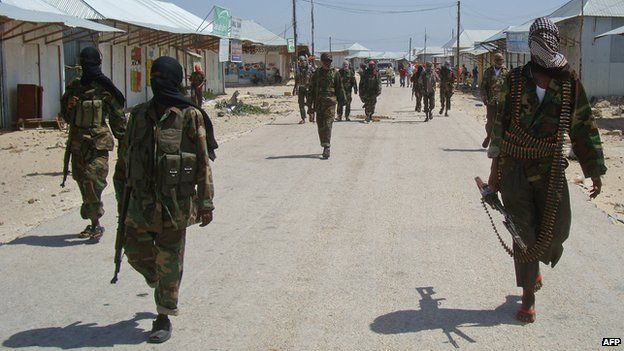The UN Security Council has unanimously agreed to lift sanctions against Eritrea after nine years.
An arms embargo, asset freeze, and travel ban were imposed in 2009 amid claims Eritrea supported al-Shabab militants in Somalia.
The resolution, drafted by the UK, was backed by the US and its Western allies.
The UN vote comes amid a thaw in relations between Eritrea and its neighbours following years of conflict.
Eritrea agreed a peace deal with Ethiopia in June, while the leader of Eritrea and the UN-backed government in Somalia have also met three times this year.
Why were sanctions imposed?
The resolution, backed by 13 votes in favour, was passed after the UN Security Council accused Eritrea of arming, training and equipping armed groups including al-Shabab.
The UN had frequently expressed concern about the flow of weapons into Somalia, where Islamist militants were battling government forces for control of the capital Mogadishu.
Eritrea has also been criticised for human rights abuses and mandatory national service conscription, which has led to tens of thousands of young Eritreans fleeing the country for Europe.
The asset freezes and travel ban affected individuals and businesses, as well as the Eritrean leadership.
However, the AFP news agency says that the UN monitors had said they had "not found conclusive evidence that Eritrea supports Al-Shabaab".

Eritrea has faced accusations of arming and training al-Shabab militants
What does Eritrea say?
The Eritrean government has always denied supporting al-Shabab militants, calling the claim a "fabrication" created by US intelligence officials. Ethiopia is a close ally of the US, especially in the fight against al-Shabab.
When they were imposed, Araya Desta, Eritrea's ambassador to the UN, dismissed the sanctions as "ludicrous punitive measures".
Eritrea occupies a strategic location on the Red Sea, which connects Europe, Africa and the East. However, its economy has suffered after years of sanctions.
The Eritrean government now says it wants compensation for the sanctions, which it insists were politically motivated.

How peace has broken out in the Horn of Africa
By Emmanuel Igunza, BBC News, Addis Ababa
Since the sanctions were imposed, Eritrea has lobbied and fought hard against them. But three times over that period, the UN Security Council has always voted to maintain them, claiming the country was a destabilising factor in the Horn of Africa region.
But all that seems to have changed after Eritrea signed a landmark agreement with Ethiopia in June, committing to end a bitter two-decade dispute.
Since then, diplomatic ties have resumed and both air and land transport between the two countries have re-opened.
The bromance between Ethiopian's new reformist leader Abiy Ahmed and Eritrea's President Isaias Aferweki seems to have rubbed on neighbouring leaders.
Eritrea, Ethiopia and Somalia have now signed a joint agreement of cooperation, and leaders of the three countries have met personally on three different occasions this year - something that hadn't happened in years.
Relations between Eritrea and Djibouti are also thawing after years of a border dispute. There is now even an ambitious talk of the Horn of Africa countries forming an economic bloc of sorts.
Many analysts believe that there are still many issues like the border disputes to resolve before that can be achieved, but so far leaders of the region are daring to believe.
Latest Stories
-
Academic City is chartered: Redefining tertiary education in Africa takes full force
3 minutes -
Financing challenges to remain in Ghana, Zambia – Fitch
14 minutes -
GUSA president calls for government aid amid funding crisis
24 minutes -
Cote d’Ivoire gets state of the art Technical Centre thanks to FIFA Forward
39 minutes -
Kwasi Kwarteng: Exposing the inconsistencies in NDC’s promise on no academic fees for first-year students
1 hour -
NDC begins interview for MMDCE aspirants in Ashanti Region
1 hour -
Government to release feeding funds for 31 days to senior high schools – CHASS
1 hour -
Tap into reserves for debt repayment amid growing international pressure – Prof Peprah to gov’t
2 hours -
Police arrest 3 in connection with alleged cocoa bean smuggling
2 hours -
Ada Chiefs urge government to ensure safety of Electrochem workers
2 hours -
Local assembly elections must be partisan, current system hasn’t worked for 32 years – IDEG
2 hours -
A Country Called Ghana: Lilwin reveals he paid Ramzy Noah over $40,000 for his role
2 hours -
GFA confirms imminent changes to Black Stars technical team
3 hours -
GCB Bank supports the attainment of 5-Ps of Sustainable Development – MD at New Year School
3 hours -
Armah-Kofi Buah: Urgent Call to Action: Fishermen in Kamgbunli face devastating fish disease crisis
3 hours

